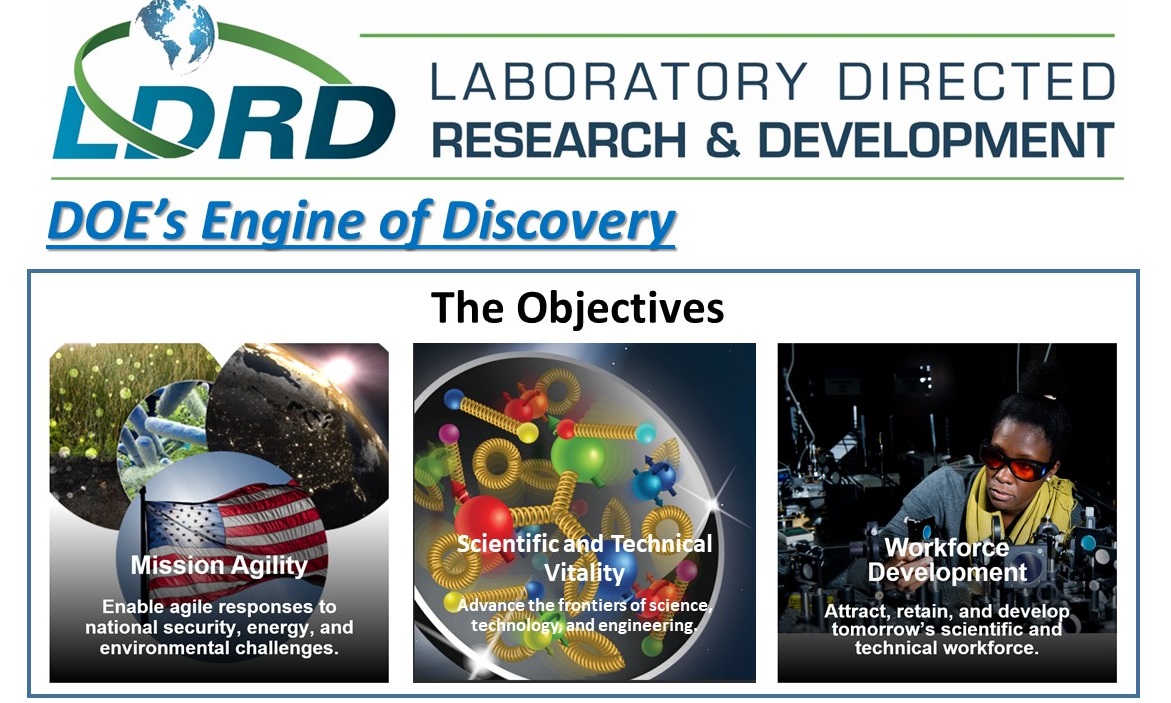Laboratory Directed Research & Development
Additional Links
LDRD Home

What is Laboratory Directed Research and Development?.
The DOE laboratories provide the nation a key service by performing R&D in support of DOE’s goals in catalyzing the transformation of the nation’s energy system, securing our leadership in clean energy, maintaining a vibrant scientific and engineering effort, and enhancing nuclear security. The U.S. Congress recognizes that it is important to sustain the creative and innovative vitality of the DOE laboratories. To this end, it has authorized and encouraged them to devote a small portion of their research effort to initiatives of their choosing which are relevant to DOE and national security missions. Since 1991, these efforts have been designated as Laboratory Directed Research and Development (LDRD). The core mission of the LDRD program are summarized in its objectives: 1) facilitate Mission Agility, 2) enhance Scientific & Technical Vitality, and 3) expand opportunities for Workforce Development.
LDRD projects must be in the forefront areas of science and technology relevant to DOE/NNSA missions. Normally LDRD projects will be relatively small and will also include one or more of the following characteristics—
- advanced study of hypotheses, concepts, or innovative approaches to scientific or technical problems;
- experiments and analyses directed towards “proof of principle” or early determination of the utility of new scientific ideas, technical concepts, or devices; and
- conception and preliminary technical analyses of experimental facilities or devices.
A resource with descriptions of a sampling of projects from each National Lab is available at this link.
A broader description of DOE’s LDRD program can be found in the DOE website on Lab Directed Research and Development.
LDRD at JLab
JLab’s LDRD program began in 2013. It is an important element of Jefferson Lab's strategic vision. It enables the Lab to respond to timely scientific and technological opportunities that also support DOE’s research and development mission. The program provides the resources for JLab staff to make rapid and significant contributions to critical national science and technology problems of mission relevance to JLab and the DOE. LDRD also can advance the Lab’s core scientific and technical capability and permits seeding and exploration of exciting new opportunities.
Projects in the past have touched on a variety of topics including novel approaches in data analysis, extending the reach of new detector systems to access science that would otherwise require a higher-energy accelerator, and development of specialized electron sources that could be of benefit in collider accelerators. Recently topics have included applications of machine learning to experimental data analysis, to nuclear theory and to accelerator fault analysis. In some years, a topic of special interest is identified.
Additional information about JLab's LDRD program can be accessed by clicking the link at the left of this page. Information about applying for funding is accessible there as well.
Contact information
If you have questions regarding JLab's LDRD program please contact either the LDRD Program Manager (Latifa Elouadrhiri) at latifa@jlab.org David Dean at deandj@jlab.org .

